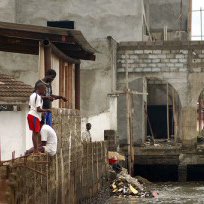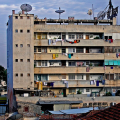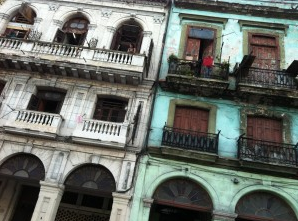Equatorial Guinea on $508 a Day

A few people asked me to say more about the high cost of visiting Equatorial Guinea.
Yes, a basic hotel room really does cost $400-500 a night, and sometimes much more. There are no hostels with merry young backpackers hanging out at the beer garden, and no home exchange vacationers looking to trade housing from an offshore oil center with an apartment in a hipster neighborhood in Portland, Oregon.
Couldn’t I sleep on the floor of the airport? Not really—it’s not that kind of place. I’ll be sleeping on the floor of Hong Kong’s airport next week before coming home, but HKG is the Hilton of airport sleeping. If I attempted to stay overnight at SSG, I would at least be questioned, and could very well be arrested. Soft adventurer that I am, I’d rather avoid that.
Thus, when encountering such a situation, I do what I have to do. I pony up the money, all in cash because the country doesn’t accept credit cards of any kind, and head up to the dingy, one-star room. I also find the whole thing fairly ironic, because I’ve stayed in my fair share of dingy, one-star hotels—see this old post for one of my favorites—but I’m not usually paying $400 a night for them. No, most definitely not—but if you were to come to Equatorial Guinea, that’s probably what you’d have to do too.
Notes on the Rich Getting Richer
I also want to say something that will probably get me in trouble, but once in a while you should say what you really think. The thing about Equatorial Guinea, and most other African countries in similar situations, is that the people are poor not because they are meant to be poor, they like being poor, or because they’ve done anything wrong.
For the most part, the vast majority of people in places like Equatorial Guinea are poor because of a lack of opportunities, and a system of corruption that discourages savings and investment. To put it more simply, a few people have a lot of money, and most people have almost no money. None of the development, or at least very little, actually helps most of the people that live there.
Everyone I met in Malabo was nice—well, except for the hotel clerks, who were clearly under orders to extort as much money as possible from visitors. It’s not the people’s fault that government officials are stashing the cash that belongs to the country in their own overseas bank accounts. The president’s son, for example, lives in a $35 million mansion in California. By all accounts, he did not get rich selling ebooks.
This is how it works in Nigeria as well—a country that should be rich is actually very poor. Nigeria produces two million barrels of oil for export every day, but its villages and even large cities often go without electricity. The country used to rank dead last on Transparency International’s scale of global corruption. Then one year it “lost” the record of most corrupt country in the world to Bangladesh. The joke among my African friends was that Nigeria had paid off Bangladesh to take its place.
One theory calls this the “resource curse” of Africa. Countries that have oil or other natural resources, like Nigeria, Equatorial Guinea, Angola, or Sudan, end up with large pockets of the population that are completely left behind. Meanwhile, countries without a lot of natural resources (Botswana is the most frequently cited) tend to do much better in terms of reducing absolute poverty and providing healthcare for their citizens.
Whether that’s true or not, I think it’s sad that corruption and exploitation are the normal patterns of business in much of sub-Saharan Africa. Of course, I should note that my government and most other Western governments are complicit in this arrangement, because the arrangement supports everyone involved. Everyone, that is, except the people who most need the chance to create opportunities for themselves, to raise healthy families, and to make their own choices. I hope it will change but I’m not sure it will.
I also realize I’m a rich, privileged person, writing mostly to other rich, privileged people who read blogs about life planning and unconventional living. So I’m not really complaining about my $400 one-star hotel room, as much as I’d rather spend that money on something else. Some people have a car payment every month; I ride the bus so I can visit random places like Equatorial Guinea. It works out OK.
No, what makes me uncomfortable is that in this case, none or very little of this money seems to be doing much good for people who need it. Some people are very rich, but most are very poor. Maybe the oil workers (and me) are funding the president’s son in his California mansion. Since there’s no transparency and few checks and balances, no one really knows for sure.
***
Anyway, after visiting Equatorial Guinea I went to its next-door neighbor Cameroon, a fun and lively place. I don’t know a lot about Cameroon, but having lived for some time in similar countries (especially Benin), I found it joyful and lively.
It was also quite hot, but that comes with the territory. I went for a long run that became a short run when I had to stop after 25 minutes in the heat. But it was a fun place nonetheless, and it left me with a more hopeful feeling than I had across the way in Equatorial Guinea.
That’s how I see it from my distorted, privileged traveler’s perspective. I know there are a lot of other active travelers among our group, as well as many people who live in countries hindered by corruption, so feel free to share your own views if you’d like.
###
Image: John








59 Comments
hello Chris, thanks for this post. it’s again giving a lot. as far as the poor African countries are concerned and thier attitude to money – this seems to be something out-of-Africa people (f.e. Polish) can’t fully understand.from one hand everything seems it should be done in a different way (f.e. how to divide the small money between the people and why it is always divided wrongly), but from the other hand – we do not live there everyday life. I assume there is some internal, African reason they behave in such way. I recommend all of Ryszard Kapuscinski books. f.e. do you know when a bus departs from the bus-stop in Africa? at the schedulled time? no, it only departs when it’s full of people. the time is running in Africa in a different way, as well… 🙂
…something that will probably get me in trouble…
No trouble from me, Chris – I love it when you talk politics. These things need saying (she said, safe in her Western middle-class white bubble), and frankly, I think the privileged have an obligation to recognize and discuss their privilege.
More of this sort of thing!
Léan
Hey Chris,
Really, really enjoyed this post and your blog in general. You are an inspiration to me and many others. I am a student and have been living in Berlin since January and have been trekking all over Europe to the best of my financial ability on weekends and such. It’s especially inspiring to hear stories like yours for me because I feel like I am at this huge crossroads in my life (college graduating.. eeeh), where I am about to decide what kind of life I want to lead for the rest of my life. I’m scared of giving up on a lot of my adventures and travel dreams because of having to support myself. But hearing your stories from the road have really made me think about ways that I can both have my travel dreams and have a fulfilling career.
I hope that you are hanging in there ! Keep livin the dream!!!!
Very true about the rich getting richer. In Kenya, the salary (including benefits) for Ministers of Parliament is over $17000 a month. The average income in Kenya is around $20 per month.
Even when African governments do try to clean up and expose some of these corrupt deals, they get no help from the West (in prosecuting the corrupt or in recovering the stolen money).
Blessings on your remaining travels.
I’m interested to know if you have seen much evidence of Chinese investment and influence in Africa this time around, especially compared to when you were there before. A pretty big part of the expat population in Beijing is from Africa and I know that the ties between China and Africa are getting closer and closer, but most of what I’ve heard is that it’s pretty one-sided, in favor of the Chinese and that there still isn’t much benefit for the majority of the people in countries like Eq. Guinea.
You hit the nail right on the head, Chris. It’s tragic, really, because you know things won’t change in those countries. The rich will continue to hold onto the wealth – and the poor will continue to go without. There seems to be no way to break the cycle.
Thank you for sharing your adventures with us. So many Americans never step foot out of our country – so they never realize just how privledged they are. I spent time in improverished areas in both India and Mexico – and it totally changed my life. More Americans need to see what life is like for the majority of the world – even if it’s only through your eyes.
Hey Chris, I think Botswana is less like its neighbours due to its very small population (less than 2 million). Nonetheless, it sounds like EG is a poster child for African corruption. When I was in Tanzania last year, the locals spoke constantly of corruption, but nothing like what EG sounds like. Many thanks for the post; certainly opened my eyes to another world.
Yes, mirroring Léan’s comment, same here: I do really appreciate your socio-economic and political comments. You are not an ordinary tourist, so your comments should always reflect this. I will look into Maciej’s recommended readings (Ryszard Kapuscinski) My recommended readings are all of the books from Jean Ziegler. Do you know him?
I mentioned your $500 hotel room in Equatorial Guinea yesterday to my father (former career diplomat in sub-saharan Africa) as we were driving back to DC and we started in on a similar conversation. I spent time in Africa as a child, but was very much protected as a diplomat’s kid (i.e., nice house, A/C, etc.). Even then I questioned the vast economic divide and income disparity – it just made no sense when we lived in Gabon, another oil rich country, that the president would build the most expensive presidential palace (at that time) yet the streets were full of kids trying to earn a few pennies. One of the reasons why I like microfinance as a development tool is that it seems to go around government and corrupt officials and work directly with regular people and invests faith that regular people can pull themselves out of poverty. I look forward to seeing it all for myself in the near future.
Good post. I can highly recommend two books by the British development economist Paul Collier: The Bottom Billion, and Wars, Guns and Votes. He looks statistically at what factors seem to cause economic stagnation and underdevelopment and mass poverty. Corruption does play a huge part, but its negative impact can be slightly less if (like in many Asian countries) the stolen wealth is then invested within the country (in real estate or factories, for example), rather than sent to Swiss bank accounts, or used to buy luxury cars and California mansions.
Collier also talks a lot about how natural resources can be a real trap, increasing autocracy, gutting democracy and fueling patronage and corruption while discouraging productive investment. The only quibble I have with your post is that Botswana, a success story in African development, actually has huge natural resources (diamonds) which are actually used to develop the country thanks to a relatively enlightened government.
Too bad corruption is not confined to Africa. Been thinking some same thoughts here in Louisiana.
You’re not being political, Chris, you’re simply stating the truth.
Gosh, you could say the same thing about the situation in the USA these days as well. America has the largest equality gap of any of the developed countries and it is has been growing at an alarming rate over the past 30 years. With current policies (relaxed regulations, lax enforcement, cutting taxes for the rich while cutting benefits to the poor, lack of investment in clean energy technology, lack of upkeep of infrastructure, etc.), you’d think someone decided along the way that being a banana republic was the way to go and made deliberate policy changes in order to make it happen.
It’s the fatalism, both here and in countries in Africa, that really disheartens me. Most people come to accept what’s happening as the new reality, and they feel powerless to change the status quo. Often, people who benefit cannot resist rigging the system so that it becomes progressively harder to change the status quo.
I’m not an active traveller — I rarely travel at all — and whether I live in a country hindered by corruption is up for debate since I live in the U.S., but I like hearing your front-line travel stories. They keep me connected to the larger world rather than to the rather small one that usually comes through my computer.
I blog from a somewhat limited perspective, so I enjoy the broadening effect you’re having on me.
Thanks for writing (and publishing) this post, not that it’ll change one tiny bit of what’s going on over there. You are right, Africa is what it is and it will only get worse, if that’s even possible.
Much sadder is the fact that your own country appears to be headed into the same direction. Slowly, but it’ll happen. And I’m not sure that there will be people left who will stand up and fight when that day comes.
You say the US government is complicit in Africa’s corruption and exploitation; that it prefers and somehow benefits from Africa’s abject poverty and corruption. That’s a pretty cynical charge. But where’s the evidence? How does the government specifically benefit?
Your operating assumption seems to be that wherever there is poverty in the world, the US is a likely suspect. But our ineffective efforts to build up just one nation–Iraq–reveal our limitations in this regard.
The US government can be accused of many things, but Africa’s impoverishment is not one of them.
Greetings everyone! Thanks for all your comments. Just a couple quick replies while I’m in transit:
@Matt,
Yes, there is a huge (not exaggerating) impact of China on Africa these days. I’ve read a lot about it but never saw it so clearly before this trip. On my Ethiopian Airlines flight to Douala, about two-thirds of the passengers were Chinese migrants, on their way back home after working in EG.
@Graydon,
Good points, thanks. I like Paul Collier.
@Shanghai TV,
Most Western governments, including but not exclusively the U.S., routinely prop up dictators and corrupt regimes throughout the world through investment and recognition. Sad but true.
I agree with other commenters that this isn’t a political discussion, but a “truth” discussion. I’ve never experienced anything like these circumstances. My times of travelling have been safely within the United States, or to other developed countries. The closest I’ve come was Mexico, in a touristy town. They still had children begging in the streets, but nothing this bad.
It’s heart-rending to see children having to beg for a few cents as a means of income, and I gladly help out where and when I can.
Hi Chris, thanks for these stories. I haven’t been in Equatorial Guinea yet, but I had a similar experience almost 10 years ago in Yaounde… For some years I frequently travelled to Africa because of its diversity, wonderful people and so on. But well, exactly what you have been just living through and seeing this difference between the few and the many others makes truly sad – especially as it doesn’t seem possible to find a good way to help.
I fear that we are part of the ones having created this situation. Part of it seems was accepted or created because of the cold war. Now it’s either habit or more probably again a fight for the best access to these natural ressources. It’s again a “game” to aimed at supporting the few rich ones in order to have achance to stay in control of the ressources and be able to take as much as possible out of the country / continent.
@Shanghai Ty – Using your own words, I think corruption, exploitation and impoverishment are distinctly different themes. Would you say selling arms to African governments and/or militia count as any of these themes? I’m certainly not blaming the US for the African problems, but hey, I think we’re all responsible in some way. It all comes under the umbrella of humanity doesn’t it?
And if I remember correctly, even Clinton mentioned his biggest regret in office was his apathy during the Rwandan conflict. Are we somewhat complicit if we sit by doing nothing while millions of people are slaughtered? I personally think so.
Thanks for making the people of Equatorial Guinea real this morning.
One of my chief passions is exactly the story that you wrote today. Ultimately, I think if we all had friends in places like Equatorial Guinea, or Iraq, we would have more compassion for the people who live there — and perhaps demand change. I never like the word should, but we should all travel more. I think the moment we identify with each other through experience, we make each other human and real. Sometimes it is easy to see other groups as statistics, or even worse as them.
Enough of a soapbox for me.
devin
Can you suggest anything practical that well-intentioned westerners can do? I remember that you were raising money for clean water, so you obviously think some projects are worth supporting.
My best guesses are clean water, immunisations, mosquito nets and micro-finance, but I’ve never been to Africa, and I’d love to hear your better-informed opinion.
@Sheila,
That’s a great question. Because it’s so important, we’ll look at the whole thing in more detail with an upcoming post. In the meantime, our Water for Ethiopia project is indeed alive and kicking (and I believe in it very much).
The people are the true government of any nation when they realize their own collective strength.
You might be interested to hear what the music industry is doing about the new state laws in Arizona (immigration). Many bands and industry people are uniting and boycotting Arizona for its laws that they deem unethical to humanity. There is also a business boycott as well…various cities are boycotting Arizona!
If MANY of us choose where we spend our money, vacation dollars, product selection ethically… etc it would make a HUGE difference.
If the music community can unite…its a good sign. Maybe the rest of us can unite in our own group and individual ways and get together and start a million little global revolutions.
Get enough of us together that support positive products, countrys etc and refuse to support others and it’s a BIG deal!
A great post, and I can’t imagine why readers would be put off by you speaking your truth/observations as you see them.
I agree with Graydon that it’s not the presence or absence of natural resources that creates the inequalities, per se. It has everything to do with the government policies that are created regarding who “owns” the resources (more often than not large corporations from developed nations–the new wave of colonialists) and how the wealth generated from resources such as oil, gold, diamond and other useful metals get redistributed within the country.
Should I point out how the developed world usually responds to these small countries when they decide to nationalize their own resources–resources that those of us in the “global north” are addicted to and must have to maintain our present infrastructures and lifestyles of choice??? It’s a mighty uncomfortable, to say nothing of inconvenient, truth to have to look at our complicity in all of this…
This was such a thought-provoking post (just wish you had posted more pics, haha)! I agree with everything you said 100%!
Great commentary, Chris. All of us who consume oil are complicit in the oppression of others. Jimmy Carter told us decades ago that it was time to find alternative energy, but people thought he was a downer and elected Reagan.
Oil party!
You’re absolutely right about this Chris, and it’s the one thing I hate about the world and human nature. I so want things to be different. Thanks for keeping us in the loop.
The old saying “absolute power corrupts absolutely” seems to apply here. This is what tends to happen in a monarchy or oligarchy where power is held by an elite few and we can see this pattern going back all the way to feudal Europe. Today we see these elite few in bed with corporate imperialists, socialist leaders and other centers of wealth and power to benefit themselves. I see these patterns throughout central and south America too, where the world’s desire for shrimp for instance leaves pushes locals out of their native areas and devastates the mangroves.
I’m going to stop there before I get too high up on my soapbox about the illusion of power granted people by elections 🙂
Political issues are important Chris. An informed people are armed to make better decisions. Safe travels to you.
You mention “the resource curse” in Africa. Have also heard the phrase “kleptocracy” bandied about, whereby everyone takes a bit along the way leaving the last one with nothing. Unfortunately, as you note, we have lots of identifications for the problem, but seem short on solutions.
Chris-
You’re absolutely right. It’s the institutions and systems set in place that so many times keep people from being able to get themselves out of poverty.
After seeing poverty up close in so many countries, it still boggles my mind, that some Westerners feel that “if they really didn’t want to be poor, they wouldn’t.” It’s amazing what we take for granted and the simple fact that we have the opportunity to go out and live unconventional lives if we choose to. A lot of people don’t have that choice.
That said, I’m sure most people have heard of it, but Kiva.org is doing amazing things by providing small entrepreneurs in developing countries a way to start a business and make a good, honest living for them and their families through micro-lending. If you haven’t heard of them, you should definitely check it out and consider being a part of it. Keep up the good work Chris.
Hi Chris!
I just happened upon your posts and have been enjoying catching up. I’m probably older than most of your readers but certainly not wiser. I began traveling about ten years ago and very much appreciate the opportunity to learn from other people’s experiences. It certainly makes it easier to believe in quantum physics when you realize that so much of the world and our interaction is contigent on perspective and attitude! So much for my two-cents-worth, I just wanted to tell you that I appreciated your efforts and courage too!
The corruption embedded in Africa’s culture is their albatross. Most of Africa’s problems originated by coloniization by european countries who used their advanced “technologies” to maintain power. True, in rare circumstances, some good things were achieved, but by and large their main contribution was to foster deep tribal differences, utilize the intelligencia that existed. Nigeria is just one such example. The French, the Dutch, the Italians, etc also did not address the poverty they found, but contributed to that disparity in the population. At this point to affect change is almost impossible as long as western governments sanction this activity.
I really appreciate you telling it like it is. While the imbalance is not right, I also agree with Terry that our own oil consumption makes us all complicit. The one clear step we can take is to simplify our life and reduce our consumption of oil Live simply so others can simply live.
Hey Chris. Great post, and good thoughts. It really is a sad situation in some parts of the world. Keep up the good work in educating us and enjoying the traveling 😉
O_____O
can somebody explain why a hotel room costs 500$/night?
Wouldn’t natural market laws.. find somebody else doing the same job for 100$/night?
Or is there some sort of hotel-mafia keeping prices high?
Very topical Chris – and not only for you who are travelling through there. For an interesting review of the situation facing Sub Saharan countries in Africe a really good read is DEAD AID by Dambisa Moyo. She provides real insight into the plight of the peoples and delivers an alternative to the aid support model that has seen so many countries plummet in terms of real poverty in the last twenty years.
Keep up the conversation.
Chris,
Having worked in the projects in Africa (Zimbabwe, Zambia, Malawi etc) as a UN worker, I’m happy to know that this kind of story also gets attentions and comments. One answer to Sheila’s question is definitely to inform yourself about what’s going on instead of being concerned just about your corner of the world. Someone (Elie Wiesel?) said “The opposite of love is not hate, it’s indifference”. One thing anyone can do today is to start caring. I look forward to your upcoming post on “what we can do”.
Etsuko
Well said, Chris. I won’t pretend to know much about what’s going on in Africa besides a general awareness/assumption that poverty and corruption reign, but I have to believe that awareness–sharing stories like yours–has to be a small first step to change.
Thank you for putting Equatorial Guinea on the map for me. Living in LA, and working with a lot of inner-citty kids from South and East LA, it’s so easy to contain your outrage for your own community’s suffering. Compared to others, they have it made.
Maybe I’ll incorporate some geography/human rights/effects of dire poverty on our next group counseling session. I bet they will think twice about their standard of living, educational system, and natural and technological resources.
Thank you for this Chris.
Anyone reading these comments might be interested in the New York Times articles “Liberia’s Missing Millions” May 30,2010 and “A Female Approach to Peacekeeping” March 5,2010.
For those who are interested in learning more about Western influence in Africa, I’d recommend Howard French’s book: A Continent for the Taking: The Tragedy and Hope of Africa. A journalist who lived in Africa, he gives an eye-witness account of the genocides in Rwanda and Congo, the AIDS epidemic, and the exploitation by Western powers.
@Matt
He’s also written a few good articles on China’s relationship with Africa. Google “china africa howard french”.
Love your thoughts, observations, and writing, Chris. If everyone traveled, even just a bit, the increased compassion and understanding would change this world.
I have not been to Equatorial Guinea or Nigeria, but your experience brought me to my time in East Africa in 1999, where the average pay was $1 per day. In Rwanda the poverty and corruption seemed most apparent; we paid the most for the least (except the amazing trek to the gorillas). And this in the most physically beautiful landscape.
I felt so deeply the hurt and anger (and sometimes just apathetic resignation) I saw in everyone’s eyes (not to mention the physical evidence), left over from the genocide a few years earlier, that I got physically sick while there.
We had a long emotional conversation about this with a travel companion who grew up in Africa. We felt so absolutely powerless to do anything; we wanted to do something/anything, but were told that is just the way it is.
That still haunts me.
Great post Chris, it is always good to remind ourselves that our “normal” is not normal for the majority of the world. I do agree with an earlier poster though that Botswana is a great success because of natural resources – namely diamonds.
Also for those that want to help go first to your bookshop and leaf through a book called Dead Aid by Dambisa Moyo. The book is not big and I read the whole thing in the store. She talks about the investment that China is making but also that if we want to help we need to make sure that everything we do is though the actual communities.
I grew up in Africa and have spent my life wanting to “help”. I’ve done it in various ways and Dambisa’s way is the only way I’ve have found that really makes a difference and cuts out the corrupt middle man.
Chris’s water for Ethiopa project sounds great and I support Room to Read but go out and do the research and find a community that resonates with you.
Okay. I too will get off my soapbox now….
Based on what you said, it appears to be the same situation in Cuba, where I recently returned from. The poor stay poor, and the few that are rich remain rich.
But corruption and power is what makes the world go round. Sites like yours empowers us to stand up and take charge of our lives. That’s what the great appeal is to me, at least.
Keep writing, and safe travels,
Aaron
Hey Chris, loved the post mate. I spent some time working in Malabo and struggled to understand for a while why places like EG and Nigeria were so resource rich, yet the people so poor. Then I stumbled upon John Perkin’s ‘Confessions of an Economic Hitman’ where he explained how this was the case, how government officials in these countries can be corrupted and take on massive infrastructure projects benefitting only a few, mainly US contractors like Halliburton, but leave the rest of the population with a massive debt and having valuable money diverted away from healthcare etc. And then when they can’t repay the debt, resources like oil are sold at pennies in the dollar. The way forward? The Venus Project.
Keep up the good work mate!
I resent the statement made by the person who said America has nothing to do with Africa. American and almost all the european countries and esp. China(recently) have a lot to do with Africa’s misery. 1) China helped funded the massacre in Darfur(look it up) or how the Rwandan Genocide happened.
2)European countries have been exploited Africans via chattel slavery and colonialism for who knows how long and like someone said earlier the US is a major distributor of guns and investor in political corruption.
Please don’t try to think about how sad or corrupt Africans are while taking a blind eye to history.
What I think is even sadder is people can’t seem to understand why Western ‘help’ never works in Africa and the people seem to suffer in spite of political mismanagement. Perhaps they see foreign aid a lesser of two evils and know that outside help has always come at a cost.
@Joe Grella. My thoughts exactly
I had left this comment on Facebook AONC page but the fact that my country is mentioned makes me want to keep talking. Infact as i’m writing this, there is no light (electricity)
Chris, as i said, this is what i call “Hitting the nail on the head”. I’m from Nigeria and still in Nigeria so i know exactly what you are talking about, it’s very though for the average citizen to simply rise up and achieve without having political connections, related to one or be a politician. It has been this way for a long time and we seem to have gotten used to it.
Apart from the though life though, Nigeria is a very interesting place to live and the people are interestingly different.
Meanwhile, i guess you are in Cameroon. Hope you’ll visit Nigeria? If you’ll, i would love to see you and take you around.
Great post Chris, thank you for continuing to provide a unique perspective of the world. I sometimes forget how lucky I am to live in the USA. I know that we have many problems and social issues, but we have opportunity, and opportunity is the base line for success.
Hi Chris,
Glad you got to EG! I lived there for quite some time researching primates and the bushmeat trade and fell in love with the place. Didn’t have quite the economic burden that you did, however, since my research was sponsored in part by the oil companies wanting to make their “charitable contributions” known… It was devastating poverty for sure, but also amazing biodiversity that is being lost to a trade which finds its validity in a culture of “rich getting richer”. Bushmeat is a prized delicacy, and the primates and other rare animals are finding themselves to be the latest casualty of economic war. I hope to go back at some point, but I’m afraid I might be saddened by further destruction.
Thank you for your inspiration and I hope you were able to see some of the beauty of the island!
Dude – sounds pretty familiar. I think you’ve been to Rwanda already, so you know the routine. Rwanda may not be another EG, but being land locked, emerging from genocide, not too friendly with the neighbors, and poor enough to foster opportunism everywhere you go, it is an expensive place.
How do you personally balance the “I’m a privileged North American” with “I’m clearly getting hosed” when pulling out your wallet in the Global South? After years of traveling, I’m still trying to figure out that one.
C
I was in Senegal for the first 5 weeks of the year. I spent most of my time in the northern part of the country, in Saint-Louis. There, my professor, a senegalese man, told me about the corruption in the gov’t and how there is a great influx of money, but it is all being held in Dakar either in their pockets, or their pet projects. WHen I was in Dakar, I spoke with a taxi driver about the new statue that was erected on one of the mamelles in the city, and he, like most in the country, hated the statue. While this is not the same level of corruption, it does say something when the gov’t is not following the wishes of the people. We see this often around the world, and it is disappointing.
Thank you for talking about EG, that was something I didn’t know about before.
Sad but true. I witness the same thing over and over again in Mexico. Things will never change until the government changes. The regular people are always getting the short end of the stick. The only way to break the cycle I think is by revolt. Politicians, Guns & Money – always a bad mix.
The problem is the system and the greed.
But one thing which is much more important is that you chose to write about it. This shows courage.
One can write a long political commentary on what is wrong and what needs to be done, but the fact remains that till there is information equality in the world, it will keep happening.
Thanks for the post.
Thanks for these important reflections,
Although many African governments are corrupt (as so are many Western ones), it doesn’t mean we cannot play an important role in changing the situation. Judging from my own experiences, the grassroots approach always seems to work best.
Many small and local initiatives have proven time and time again that people can take their development into their own hands. The formation of cooperatives enable people to come together and generate economic activity using the resources that are available to them. This has been done numerous times without bilateral aid coming from a Northern country to the South.
What we can do as Westerners is support these kinds of initiatives. We can supply tools and expertise that are needed and requested (not imposed) by the local populations so that they can change their own situation (which they are quite capable of doing, but often lack resources). But something definitely must be done.
Just want to commend you on visiting deep parts of Africa. Many people often visit Egypt or South Africa and say they’ve “gone to Africa”. Technically it’s true, but it’s good to go into the heartland of the continent to get a feel of the complete culture.
Heard the new Sofitel there is nice and under $250/night when you pre-book (15 days beforehand or so). And free wifi!
I’m curious as to which hotel you stayed at — the Hilton also looked really really nice. But I digress…
Corruption in poor countries is my biggest pet peeve. TO the point that, whenever I am reminded of it, I get really, REALLY angry. *sighs* Maybe my new “business” should be figuring out a way to eradicate it … SOMEHOW…
But then again, I’m called a tree-hugging hippie for trying to figure that out
– Maria Alexandra
To echo what the other poster said about the Sofitel, the Hilton there is also quite nice, and quite reasonable – under $200 a night with a bit of advance purchase. Honestly, Malabo (I was there as of this morning) didn’t really feel that much more expensive than other major west african countries. That said, from what I’ve seen of Cameroon so far, I’m going to enjoy it much more.
Your comments are welcome! Please be nice and use your real name.
If you have a website, include it in the website field (not in the text of the comment).
Want to see your photo in the comments? Visit Gravatar.com to get one.